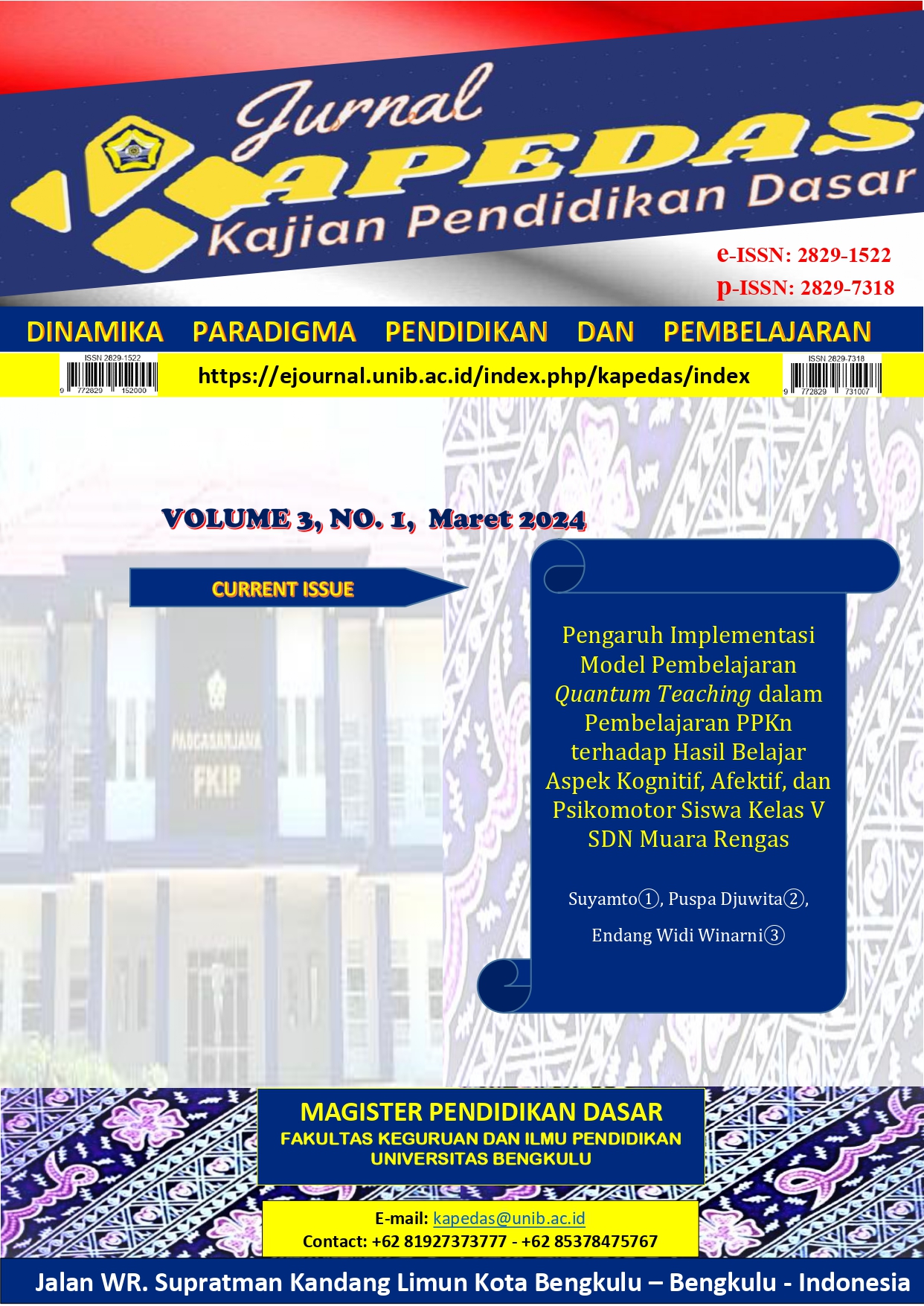Main Article Content
Abstract
This study aims to determine the feasibility of the material, language and design, student responses, and the effectiveness of the products resulting from the development of Discovery Learning (DL)-based energy source e-modules to improve the cognitive abilities of fourth grade elementary school students. This research is an ADDIE Research and Development (R&D) model. The data analysis technique in this study was validation analysis using Aiken's V and Inter-rater Reliability, student responses, and quantitative analysis using the T-test. The results of material validation, language and design as well as students' responses to e-modules are very feasible and well used in learning so that students are happy and interested in learning Natural Sciences (IPA) on energy sources material. The results of the effectiveness of e-modules are effective on students' cognitive abilities. seen from the results of the significance value, which is 0.002, which is smaller than α = 0.05. Based on the N-gain score test from the use of the E-Module, it gave a low gain score, namely the control class, 18% and the results for the moderate gain score, namely the experimental class, 34%. So that the cognitive knowledge of students using the E-Module as an energy source based on Discovery Learning is declared effective.
Article Details
Copyright (c) 2024 Laila Rahmaitun Husna, Endang Widi Winarni, Irwan Koto

This work is licensed under a Creative Commons Attribution-ShareAlike 4.0 International License.

Karya ini dilisensikan di bawah Creative Commons Attribution-ShareAlike 4.0 International License .
References
-
Adiarta, A., Divayana, D. G. H., & Suyasa, D. W. A. (2018). Pelatihan Pembuatan Buku Digital Berbasis Kvisoft Flipbook Maker Bagi Guru di SMK TI Udayana. Jurnal Abdima Dewantara, 1(2), 31-41.
Awaliah, L. N. (2022). Pemanfaatan Aplikasi Canva Sebagai Media Pembelajaran Matematika. Prosiding Galuh Mathematics National Converence. (hlm. 175-182). Ciamis: Universitas Galuh. ISBN: 978-623-95169-7-0.
Kutulus, A., & Ersoya, M. (2011). Prospective Secondary Mathematics Teachers’ Opinions About Electronic Geometry Textbook: e-geo and its usage. Social and Behavior Sciences, 15, 33-36.
Kosasi, E., (2021). Pengembangan Bahan Ajar. Jakarta Timur: PT. Bumi Aksara.
Rahmadayanti, D., dan Hartoyo, A., (2022). Potret Kurikulum Merdeka, Wujud Merdeka Belajar di Sekolah Dasar. Jurnal BASICEDU. Vol 6 (4). 7174-7187.
Saani, A., (2013). Inovasi Pembelajaran. Jakarta: Bumi Aksara.
Suardi., (2018). Belajar dan Pembelajaran. Yogyakarta: CV. Budi Utama.
References
Awaliah, L. N. (2022). Pemanfaatan Aplikasi Canva Sebagai Media Pembelajaran Matematika. Prosiding Galuh Mathematics National Converence. (hlm. 175-182). Ciamis: Universitas Galuh. ISBN: 978-623-95169-7-0.
Kutulus, A., & Ersoya, M. (2011). Prospective Secondary Mathematics Teachers’ Opinions About Electronic Geometry Textbook: e-geo and its usage. Social and Behavior Sciences, 15, 33-36.
Kosasi, E., (2021). Pengembangan Bahan Ajar. Jakarta Timur: PT. Bumi Aksara.
Rahmadayanti, D., dan Hartoyo, A., (2022). Potret Kurikulum Merdeka, Wujud Merdeka Belajar di Sekolah Dasar. Jurnal BASICEDU. Vol 6 (4). 7174-7187.
Saani, A., (2013). Inovasi Pembelajaran. Jakarta: Bumi Aksara.
Suardi., (2018). Belajar dan Pembelajaran. Yogyakarta: CV. Budi Utama.
